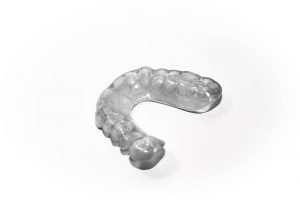Grinding your teeth, for many people, is a sign of being angry. But you should know that many people grind their teeth without even realizing they’re doing it. We’re talking about bruxism, a condition much more common than people imagine and that, when left untreated, can lead to serious consequences. Want to know more about what bruxism is, its causes, and how to treat this problem?
What is Bruxism?
Bruxism can be defined as a functional disorder, which causes a person to grind their teeth without realizing they are doing it. This type of issue, when not properly treated, can wear down a person’s teeth, making them more fragile and, eventually, more likely to fall out. In addition, bruxism can also cause problems with jaw formation, as well as bone problems and also with the gums, especially in more severe cases. There is no specific age group or gender that is more affected by bruxism, although it occurs in 15% of children, for reasons science still does not understand. This problem can manifest itself both during the day and at night, and this distinction means the condition acts differently. We will address this topic in more depth later in the text.
Symptoms of Bruxism
The main symptom of a person with bruxism is involuntary teeth grinding. It is very common for someone who sleeps with a partner to be told by them what happens during the night. However, this is only the first of the symptoms, which just indicates the onset of the condition. Other signs that may indicate you have bruxism include:
- Severe jaw pain
- Headaches
- Tooth loosening
- Ringing in the ears
- Neck pain
- Sleep disturbances
If a person has any of these symptoms, the main recommendation is to see a doctor or a dentist as soon as possible so that treatment can be started to alleviate the effects and prevent worse consequences.
Causes of Bruxism
It is still not known exactly what causes bruxism, although research indicates that this problem is probably linked to genetic factors. However, it is known that certain factors can trigger bruxism in people who have a predisposition, such as:
- Stressful moments
- Anxiety
- Moments of tension
- Malocclusion
- Use of certain medications
Aside from malocclusion, it is clear that bruxism is often related to a person’s psychological factors. For this reason, it is often necessary to see a psychologist to address this problem, as we will also discuss further below.
Types of Bruxism
As mentioned earlier, bruxism can be classified depending on how it affects the person’s body. The two types of bruxism are:
- Awake Bruxism
- Sleep Bruxism
Let’s talk a bit more about how each manifests and what their particularities are.
Awake Bruxism
Also known as daytime bruxism or brichism, awake bruxism appears, as the name suggests, during the day. It is very common for a person to find themselves clenching their teeth excessively in moments of distraction or even concentration, such as when performing a task or studying. This type of bruxism is normally triggered by moments of tension, stress, which in turn, come from emotional problems that often involve fear, frustration, and perfectionism, for example. In addition, the use of certain medications can also cause a person to develop awake bruxism.
Sleep Bruxism
As the name also suggests, this is the type of bruxism that happens when a person is sleeping. Like awake bruxism, sleep bruxism is also usually triggered by psychological and emotional issues. The main difference is that, since the person grinds their teeth involuntarily during sleep, it is common for them to take longer to notice that they have this problem, since they often do not have the habit of clenching their teeth as with awake bruxism. A person can have both types of bruxism, although they are often diagnosed with just one. This does not make much difference for treatment, since the approach is similar in both cases. 
Treatment for Bruxism
There is no definitive cure for bruxism, though many cases can be resolved in various ways. What is most recommended by doctors and dentists is the use of an occlusal splint made of acrylic or silicone that restricts the movement of the teeth, prevents them from touching, and consequently, from wearing down. Over time, the symptoms of bruxism usually decrease with the use of this type of splint. It is also recommended that a person with this condition seek the help of a psychologist to address the issues that gave rise to the condition, especially when it comes to stress or anxiety. In some cases, anxiolytic medications are prescribed to alleviate the treatment. It is important to stress that you should never take medication on your own, under any circumstances. This action, in addition to potentially making your condition worse, can also bring a host of other much more complicated problems. Bruxism is a problem that has been appearing more and more frequently in our society. And this can be easily explained by the increase in the number of people experiencing psychological illnesses. Regardless of the severity or type of bruxism you have, it is important to seek help so you can enjoy good health, both physically and psychologically. The relationship between body and mind is inseparable. One cannot be healthy if the other is not. And you need to be aware of this. See also: Porcelain Veneers











